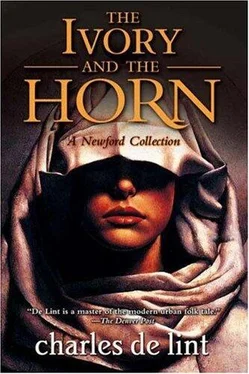"Thank you," Jilly told him. "It's not done yet."
"My name's Tommy," he said, thrusting out his hand.
He slurred his words a little when he spoke, but not enough so that Jilly had trouble following him. She laid her brush down on top of her palette. Gravely, she shook hands with him and introduced herself.
"Does it have a story?" Tommy asked as Jilly picked up her brush once more.
"What? This painting?"
"No. The box."
Jilly gave him an odd look. "Now how would you know that?" she asked.
"Everything has a story."
3
— So what do the dead dream about?
— I can't speak for others, only myself. Since my death, I've found myself existing in an odd state of mind, one that seems to lie somewhere between sleep and waking. In this place even my dreams don't seem to play fair with my sense of equilibrium. Often I feel that what I dream is real, while a moment such as this— conversing with you— is the dream.
— I think I know exactly what you mean.
— Do you now?
— I have a friend whose dreams are real— they're just real somewhere else.
— I see.
— But you haven't told me yet what it is that you dream about.
— Heaven.
— You mean like angels and the pearly gates and all?
— Hardly. Heaven was the name of the first painting I ever did which seemed to make the leap from mind to canvas without losing anything in the translation.
— So you're an artist.
— I was an artist. That was how I categorized myself, and it was through the terms of my art that I lived my life. In my present existence there appear to be only two classifications of being: the living and the dead. When you must count yourself among the latter, you soon realize that your career options are severely limited. Nonexistent, you might say.
— It sounds horrible.
— You get used to it.
— I'm an artist.
— Are you now? Well, I hope you don't let art consume your life the way I did.
— What do you mean?
— I was so single-minded in my work that the details of my life became a meaningless blur— a sfumato backdrop upon which I painted, but no longer experienced. In the end, when even my art was taken away from me, I had nothing left. I understood all too well how Monet, grieving at the death bed of his beloved wife Camille, could still find himself automatically studying the arrangement of colored gradations that death was imposing upon her lifeless features. Before he ever had the idea of recording the moment in a painting, his reflexes had involved him in memorizing the tonal succession. Blue, yellow, grey.
— Camille on Her Death Bed.
— Exactly. But while Monet went on to redeem himself in Giverny, striking a balance between the demands of his artistic genius and actually experiencing life, I painted myself into oblivion.
4
"Tommy!"
They all looked up at the figure running down the pavement toward them— Jilly, Tommy and five sleepy dogs who were suddenly almost comically alert. The approaching young woman was in her late teens or early twenties, a slim figure not much taller than Jilly with light brown hair flowing out from under an old black fedora. She wore jeans and sneakers and a short quilted jacket with white shirt tails dangling below its hem. Running along beside her was a funny-looking little wirehaired dog.
It wasn't until she got closer that Jilly could see the weariness in her features, the dark circles under her eyes. The woman didn't appear so much exhausted as stretched too tightly, the way Jilly knew she looked the week before she had a show to hang and she was working day and night trying to get the last few pieces done.
"Oh-oh," Tommy said.
"Do you know her?"
Tommy nodded. "She's my sister, Maisie."
There wasn't much family resemblance between them, Jilly thought, but then whoever said everybody in a family had to look the same?
"Where have you been?" Maisie cried as she reached them. "I was so worried."
"Just walking, Maisie. I was just walking."
Maisie sighed. Jilly got the idea that she did that a lot when it came to Tommy.
"He wasn't bothering you, was he?" she asked, turning to Jilly.
"Not at all. He's been very sweet."
"He scares people sometimes— because he's so big and they don't understand that he's not crazy, he's just simple."
"And happy," Tommy put in.
Maisie laughed and gave him a quick hug. "And happy," she agreed.
"Jilly's going to tell me a story," Tommy informed her.
Maisie looked at Jilly, eyebrows lifting.
"It's okay," Jilly said.
Neither Maisie nor Tommy were dressed well— too busy worrying about when they were going to eat and keeping a roof over their heads to worry about buying new clothes as well, she decided. It must be especially tough making do when you had a big brother like that with special needs. The least Jilly thought she could do was entertain Tommy with a story.
"Tommy wanted to know about my pochade box," she said. "I can sit with him over on the steps there if you've got some stuff you want to do."
But Maisie's gaze had gone to the box. "Pochade," she said. "That's French for 'rapid sketch,' isn't it?"
Jilly nodded trying to hide her surprise. Not many of her artist friends had known that— she'd had to provide the definition.
"I read a lot," Maisie explained.
Something clicked in Jilly's mind then, and she realized that she'd heard about Maisie Flood and her extended family of foundlings before.
"You know Angel, don't you?" she asked.
Maisie nodded. "Yeah, she's got me back into school and stuff."
"Welcome to the club," Jilly said. "I'm another one of her successes."
"Really?"
"Though I guess my time goes back further than yours."
"What about the story?" Tommy asked.
"There's two things Tommy loves," Maisie told Jilly. "Pictures and stories. If you can tell a story as well as you paint, you'll have a friend for life."
"Well, I'd probably argue about the criteria involved," Jilly said, "but I love making new friends."
She led the way over to the cathedral's steps, carrying the pochade box as Tommy brought along her stool and the drying box, which held the two paintings she'd done this morning along with a number of unused gessoed panels she'd prepared for other paintings. The dogs followed in what seemed like an undulating wave of fur, settling themselves around and upon Tommy, Maisie and the steps as though they were big, floppy beanbag toys instead of real dogs.
"I really don't mind looking after Tommy if you've got some things to do," Jilly said.
Maisie shook her head. "Are you kidding? Where do you think he got his love for stories from?"
"It's not that great a story— doesn't really have much of a beginning or an end. It's just sort of weird."
"You're stalling."
Jilly laughed. "Only partly. Mostly what I'm doing is offering up the apologia beforehand so that you don't ask for your money back when I'm done."
"We don't have any money to give you," Tommy said, looking disappointed, as though he thought that now they weren't going to get the story.
"It's just an expression," Maisie assured him. "Like letting the cat out of the bag— remember?" She turned to Jilly. "Tommy tends to take things pretty literally."
"I'll keep that in mind," Jilly said.
5
— What do you mean by oblivion?
— You have to be remembered. People have to think about you. If they don't, you just disappear. That's what happens to all those people who vanish mysteriously. Not enough people were thinking about them and eventually they faded away. They were simply forgotten, remembered only when they disappeared— BECAUSE they disappeared— and then it was too late, of course. You can't bring back what doesn't exist anymore.
Читать дальше












